
SCHWEIZERISCHES ARCHIV FUR VOLKSKUNDE
Scope & Guideline
Advancing Understanding of Cultural Traditions
Introduction
Aims and Scopes
- Cultural Ethnography:
The journal emphasizes ethnographic research that explores cultural practices, beliefs, and identities, often focusing on local Swiss contexts but also drawing upon comparative studies from around the world. - Interdisciplinary Approaches:
It fosters interdisciplinary dialogue by integrating methods and theories from cultural studies, anthropology, sociology, and history to enrich cultural analysis. - Social Narratives and Identity:
Research often centers on how cultural narratives shape identities and societal structures, with a particular emphasis on contemporary issues such as migration, gender, and environmental policy. - Historical Perspectives:
The journal includes historical analyses of cultural practices, often linking past and present to understand the evolution of cultural phenomena. - Cultural Critique:
A critical examination of contemporary cultural issues, including popular culture, political narratives, and social movements, is a recurring theme.
Trending and Emerging
- Environmental Cultural Studies:
Recent articles focusing on environmental issues, such as the intersection of culture and environmental policy, indicate a growing trend towards examining how cultural practices influence and respond to ecological concerns. - Gender and Identity Studies:
There is an increasing emphasis on gender studies, particularly how gender intersects with cultural narratives and practices, reflecting a broader societal focus on identity politics. - Digital Culture and Media Analysis:
The exploration of digital culture, including the impact of social media and technology on cultural practices, is gaining traction, highlighting the relevance of contemporary media in cultural studies. - Cultural Critique of Populism:
Emerging themes related to populism and cultural narratives suggest a critical engagement with current political climates and societal divisions, showcasing the journal's relevance in addressing contemporary societal challenges. - Transnational and Diaspora Studies:
Research focusing on transnational identities and cultural practices in diaspora communities is becoming more prominent, reflecting the complexities of globalization and migration.
Declining or Waning
- Traditional Folklore Studies:
There is a noticeable decline in studies purely focused on traditional folklore elements, such as folk tales and historical clothing research, suggesting a shift towards more contemporary cultural analyses. - Static Cultural Representations:
Themes that rely on static or singular representations of culture, such as traditional cultural artifacts without contextual analysis, are becoming less prominent as the journal moves towards dynamic and multi-layered cultural interpretations. - Narrowly Defined Cultural Practices:
Research that focuses on narrowly defined or isolated cultural practices, without connections to broader societal issues, is appearing less frequently, indicating a preference for studies that engage with wider cultural and social contexts.
Similar Journals

Ezhegodnik Finno-Ugorskikh Issledovanii-Yearbook of Finno-Ugric Studies
Pioneering Academic Discourse on Finno-Ugric HeritageEzhegodnik Finno-Ugorskikh Issledovanii-Yearbook of Finno-Ugric Studies is a distinguished academic journal published by Udmurt State University, focusing on the vibrant field of Finno-Ugric studies. With its ISSN 2224-9443 and E-ISSN 2311-0333, this journal serves as a vital platform for researchers, scholars, and students to contribute and access high-quality, peer-reviewed work that explores the linguistic, cultural, and historical dimensions of Finno-Ugric peoples. This journal is particularly essential for those interested in interdisciplinary studies, as it often intersects with anthropology, linguistics, and cultural studies. Although currently not available as open access, it provides valuable insights for advancing academic discourse in this underrepresented area of study. The Yearbook is located in Izhevsk, Russia, and is committed to enriching the academic community, fostering collaboration, and promoting understanding of the Finno-Ugric heritage.
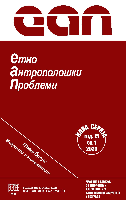
Etnoantropoloski Problemi-Issues in Ethnology and Anthropology
Illuminating the intersections of anthropology and modern life.Etnoantropoloski Problemi-Issues in Ethnology and Anthropology, published by the University of Belgrade, Faculty of Philosophy, is a prestigious open-access journal dedicated to advancing the fields of ethnology and anthropology. With its ISSN 0353-1589 and E-ISSN 2334-8801, the journal has been a crucial platform since 2006, facilitating the dissemination of innovative research and critical discussions among scholars worldwide. As an open-access journal, it ensures that valuable insights and findings are readily accessible, promoting knowledge sharing and collaboration across the academic community. The journal aims to explore and address contemporary issues in cultural studies, social dynamics, and human behavior, emphasizing the relevance of ethnological and anthropological research in understanding our increasingly interconnected world. Researchers, professionals, and students alike will find Etnoantropoloski Problemi an essential resource for staying informed about the latest developments and debates within these dynamic disciplines.
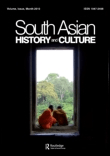
South Asian History and Culture
Fostering Scholarly Discourse on South Asian DynamicsSouth Asian History and Culture, published by Routledge Journals, Taylor & Francis Ltd, is an essential academic platform aimed at advancing the understanding of the historical and cultural dimensions of South Asia. With an ISSN of 1947-2498 and an E-ISSN of 1947-2501, this journal has established itself as a key resource for researchers and professionals in the fields of Arts and Humanities, Cultural Studies, Sociology, and Political Science. The journal occupies a significant standing in academia, reflected by its categorization in Q2 across multiple disciplines, highlighting its impact and relevance. Its Scopus rankings further emphasize its influence, ranking 31/173 in General Arts and Humanities and maintaining an 82nd percentile. Additionally, South Asian History and Culture provides a unique forum for scholarly discourse, ensuring the latest research is accessible to a global audience, thereby enriching the academic community's understanding of South Asian dynamics. By delving into themes ranging from social structures to cultural identities, the journal invites contributions that can drive forward innovative discussions and establish new paradigms in South Asian studies.
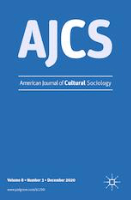
American Journal of Cultural Sociology
Illuminating the Nexus of Culture and PoliticsThe American Journal of Cultural Sociology, published by Palgrave Macmillan Ltd, stands as a premier platform for innovative research in the fields of sociology and political science. With an ISSN of 2049-7113 and an E-ISSN of 2049-7121, this journal is renowned for its rigorous peer-reviewed articles that delve into cultural phenomena, social theorization, and policy implications, appealing to researchers, professionals, and students alike. As evidenced by its Q1 ranking in the Sociology and Political Science categories for 2023, the journal is recognized for its high-quality contributions, securing a rank of #185 out of 1466 in Scopus and placing in the 87th percentile of its field. With publication horizons spanning from 2013 to 2024, it continues to advance scholarly conversation and promote interdisciplinary dialogue, making significant strides in understanding the intricate relationships between culture, society, and politics. The journal's commitment to open access initiatives further enhances its accessibility, fostering a wider dissemination of knowledge and driving forward the frontiers of cultural sociology.
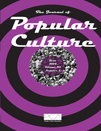
JOURNAL OF POPULAR CULTURE
Advancing the Dialogue on Popular NarrativesThe Journal of Popular Culture, published by Wiley, stands as a pivotal platform for the exploration and analysis of cultural phenomena since its inception in 1967. With its ISSN 0022-3840 and E-ISSN 1540-5931, the journal deeply engages with themes encompassing literature, history, and the broader arts and humanities landscape, further categorized in 2023 into distinct quartiles reflected by its superior rankings: Q3 in Arts and Humanities (miscellaneous), Q2 in History, and Q1 in Literature and Literary Theory. This journal not only ranks competitively in Scopus—positioned at the 73rd percentile in Literature and Literary Theory and achieving a significant recognition in History—but also cultivates a rich dialogue aimed at researchers, educators, and students alike. Through its non-open access model, the journal maintains a robust collection of scholarly articles that contribute to the understanding of popular culture's impact on society, making it an essential resource for academics and practitioners committed to this dynamic field.
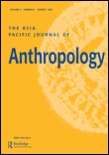
Asia Pacific Journal of Anthropology
Advancing Knowledge in Anthropology and Cultural StudiesAsia Pacific Journal of Anthropology is a premier academic journal dedicated to advancing the field of anthropology and cultural studies, published by Routledge Journals, Taylor & Francis Ltd. With an ISSN of 1444-2213 and E-ISSN 1740-9314, this journal has gained recognition for its rigorous scholarly contributions since its inception in 2000. Situated in the UK, it is strategically positioned to serve as a vital resource for researchers, professionals, and students exploring the rich complexities of human societies and cultures within the Asia Pacific region and beyond. As evidenced by its Q2 ranking in both anthropology and cultural studies for 2023, alongside its impressive Scopus ranks—#218 among 1304 in Cultural Studies and #157 among 502 in Anthropology—this journal illustrates a strong commitment to delivering high-quality, impactful research. While it is not an open-access journal, it remains a key platform for disseminating innovative research and fostering academic dialogue, thereby significantly contributing to the advancement of knowledge in the social sciences.
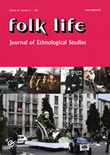
Folk Life-Journal of Ethnological Studies
Unveiling Humanity's Rich Tapestry, One Study at a Time.Welcome to the Folk Life-Journal of Ethnological Studies, a distinguished publication devoted to exploring the rich tapestry of human culture and ethnological research. Published by Routledge Journals, Taylor & Francis Ltd, this journal serves as an essential platform for scholars and practitioners within the fields of Anthropology, Arts and Humanities, and Cultural Studies. With a publication history stretching back to 1963, the journal has become a valuable resource for disseminating innovative and interdisciplinary research, contributing to a deeper understanding of diverse cultural phenomena. Despite its current quartile rankings of Q4 across multiple categories, 'Folk Life' continues to strive for academic excellence and encourages submissions that challenge existing narratives and offer fresh perspectives. Although not open access, articles published in this journal are rigorously peer-reviewed, ensuring the highest scholarly standards. Researchers, professionals, and students alike will find rigorous and thought-provoking studies within its pages, making Folk Life an important fixture in the academic landscape.
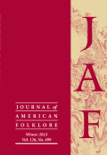
JOURNAL OF AMERICAN FOLKLORE
Diving Deep into America's Cultural HeritageJOURNAL OF AMERICAN FOLKLORE, published by the American Folklore Society, is a distinguished journal dedicated to the exploration and analysis of folklore, cultural traditions, and the diverse narratives that shape American identity. With a rich history dating back to its inception, the journal has positioned itself as a leading platform in the field, boasting a 2023 ranking of Q1 in Cultural Studies and Q2 in Arts and Humanities (miscellaneous). The journal's impact within the academic community is underscored by its high Scopus rankings, placing it in the 83rd and 65th percentiles in Cultural Studies and Arts and Humanities, respectively. Readers can access a wealth of insightful articles that contribute to ongoing discussions in folklore studies, cultural anthropology, and related disciplines. As the study of folklore becomes increasingly relevant in understanding contemporary societal dynamics, JOURNAL OF AMERICAN FOLKLORE serves as an essential resource for researchers, professionals, and students alike, enriching discourse and fostering a deeper appreciation for the cultural experiences that define America.

CULTURAL CRITIQUE
Decoding Culture, One Critique at a TimeCULTURAL CRITIQUE is a premier academic journal published by University of Minnesota Press, dedicated to the interdisciplinary exploration of cultural phenomena through the lenses of anthropology, cultural studies, literature and literary theory, philosophy, and sociology. With its ISSN 0882-4371 and E-ISSN 1460-2458, the journal serves as a vital forum for scholars to engage, debate, and disseminate innovative ideas and methodologies that redefine cultural narratives and critiques. Spanning a publication timeline from 2002 to 2024, CULTURAL CRITIQUE holds significance in various academic categories, achieving Q4 rankings in anthropology and sociology and as high as Q2 in literature and literary theory. Its Scopus rankings further reinforce its value, placing it in the 82nd percentile among literature-related journals. Although it currently does not offer open access, this journal is key for researchers, professionals, and students aiming to deepen their understanding of culturally driven debates in the contemporary landscape.

Culturales
Exploring Cultural Narratives Through Diverse LensesCulturales is an esteemed open-access journal published by the Universidad Autónoma Baja California, specifically through the Instituto de Investigaciones Culturales-Museo. Since its inception in 2005, Culturales has provided a vital platform for scholars and practitioners in the fields of Arts and Humanities and Social Sciences, fostering a vibrant dialogue on cultural research with particular emphasis on the unique perspectives shaped by Mexican heritage. With an ISSN of 1870-1191 and an E-ISSN of 2448-539X, the journal's significance is further highlighted by its performance in the Scopus rankings, where it stands at Rank #98/173 in Arts and Humanities and Rank #228/275 in Social Sciences. It is categorized in the Q3 quartile for Arts and Humanities and Q4 for Social Sciences in 2023, indicating its growing influence and commitment to quality research. As a vital resource for researchers, professionals, and students, Culturales promotes accessible, scholarly work that extends beyond conventional boundaries, encouraging interdisciplinary collaboration and enriching the academic community. The journal is available for access worldwide, specifically catering to those interested in understanding cultural phenomena through diverse lenses.